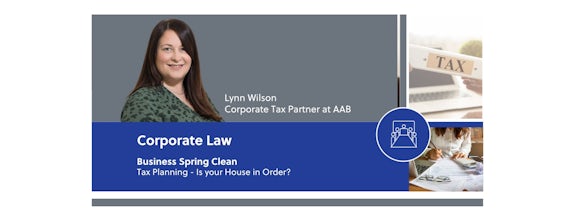Lynn Wilson is Corporate Tax Partner and part of the Corporate Tax and Expertise to Entrepreneurs teams at AAB and is a guest on our next edition of our “Business Spring Clean” blog series. Here’s what Lynn had to say…
Tax Planning – is your house in order?
Tax rules are ever evolving, but with a Spring budget on the 6th March and a potential change of government this year it is even more difficult to predict what changes might come and that’s without considering what might happen with the Scottish rates of Income Tax. However, there are still plenty of planning opportunities that the owner managed business should still consider, especially pre personal tax year end.
How does this benefit owner managed companies?
For the shareholders of an owner managed business, the company financial position is usually seen as an extension of their own personal position. Therefore tax efficiency is always a top priority and there’s plenty of housekeeping fundamentals that the owner managed business should explore to ensure they are operating in the most tax efficient way.
Dividend Allowance
Shareholders should utilise tax free and basic rate allowances. The Dividend Allowance was reduced to only £1,000 for the tax year ended 5 April 2024 so although not as valuable as it once was it is still worth having! With Income Tax increasing but National Insurance rates reducing there’s little difference in some cases between extracting profits as a bonus or a dividend and each individual situation should be considered pre 5 April.
Pensions
Another area where there were some significant changes announced in the Autumn statement is Pensions. Company pension contributions are a very tax efficient way of extracting value from your business, and you should ensure any annual allowances are utilised where possible. The company will get Corporation Tax relief at 25% in the accounting period in which they’re paid and the value will grow tax free in your pension pot. The abolition of lifetime allowances from 6 April 2024 and the increase in the annual allowance means that pensions are back on the agenda for many individuals. If you’re a higher earner in Scotland, increasing personal pension contributions might help ease the pain of the higher rates of Scottish Income Tax by attracting relief at your marginal rate of tax.
Full Expensing
From a Corporation Tax perspective, Full Expensing has been made permanent which is a welcome tax relief for those businesses with a heavy CAPEX spend. This relief provides a 100% deduction against profits in the year of expenditure on certain capital items such as plant and machinery. Where possible, it may be worthwhile bringing forward the timing of expenditure into a current tax year to accelerate any tax relief.
R&D
Where a company is incurring expenditure on Research and Development (“R&D”), there are enhanced deductions and tax credits available on qualifying activities. It is important that companies consider any R&D activity and make the relevant claim in their Corporate Tax returns. It is possible to amend the prior year return for any missed claim for R&D activity but there are strict deadlines for doing so. R&D can apply to a range of sectors, not just the high-tech, pharmaceutical type business that immediately spring to mind. However it is a complex area and it is recommended you speak to your tax advisor on whether any project would qualify.
Staff Incentives
Another challenge for many businesses just now during the cost of living crisis is how to reward and incentivise staff when wage inflation can’t realistically keep up. Providing the opportunity to participate in salary sacrifice schemes such as cycle to work or electric car schemes can be extremely beneficial and deliver Tax and National Insurance savings for the company and employees.
Equity based incentives can also be key in rewarding senior management allowing them to share in the success of the business and be aligned with delivering the growth and strategy. However, owner managed businesses can be apprehensive in expanding share ownership outside of the current shareholder group (often family). Structuring these as a share option award, such as an HMRC approved Enterprise Management Incentive (“EMI”) scheme, where the reward only kicks in on an exit event means there is no immediate minority shareholders in the business which require to be party to shareholder agreements and involved in shareholder decisions.
Business Asset Disposal Relief
An important housekeeping point for every business, especially if they are working towards an exit, is to ensure the shareholders qualify for Business Asset Disposal Relief (“BADR”). This relief applies to the disposal of shares in a trading company reducing the rate of Capital Gains Tax to 10% on gains up to a lifetime limit of £1million. Reviewing the Articles to ensure the rights attaching to the shares, especially in terms of dividend entitlement and voting rights, are all as expected should mean there are no nasty surprises if the time comes to sell the business.
Be prepared
There are many other things to be considered and it is recommended you speak to your tax advisor well in advance of a company’s year end and personal tax year end.







